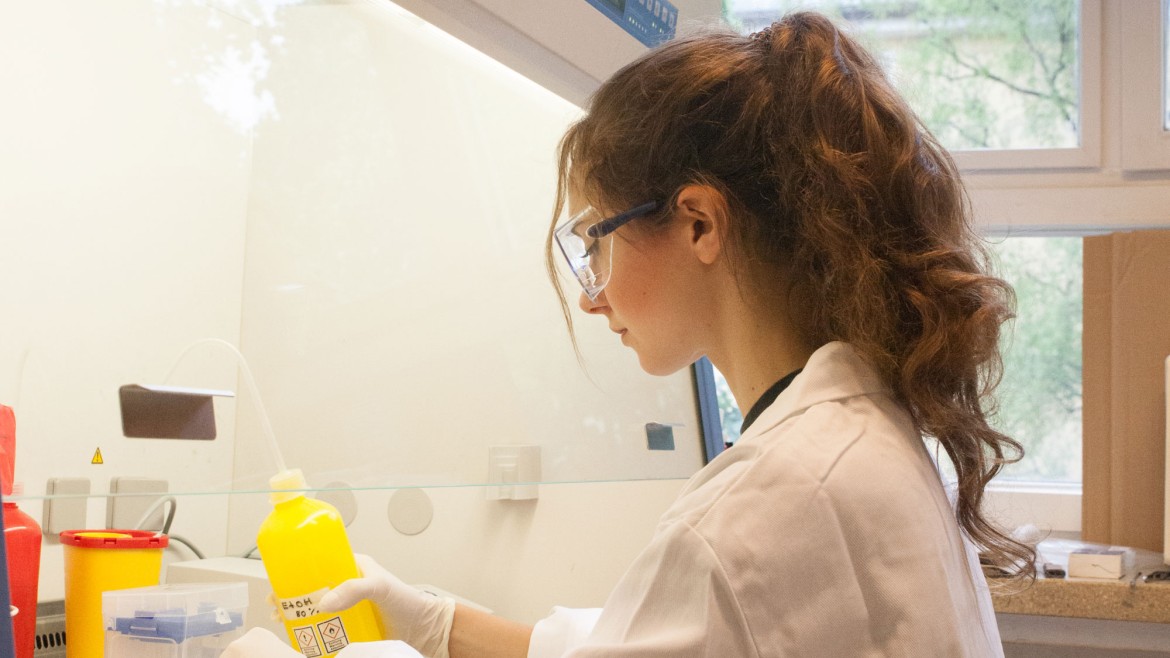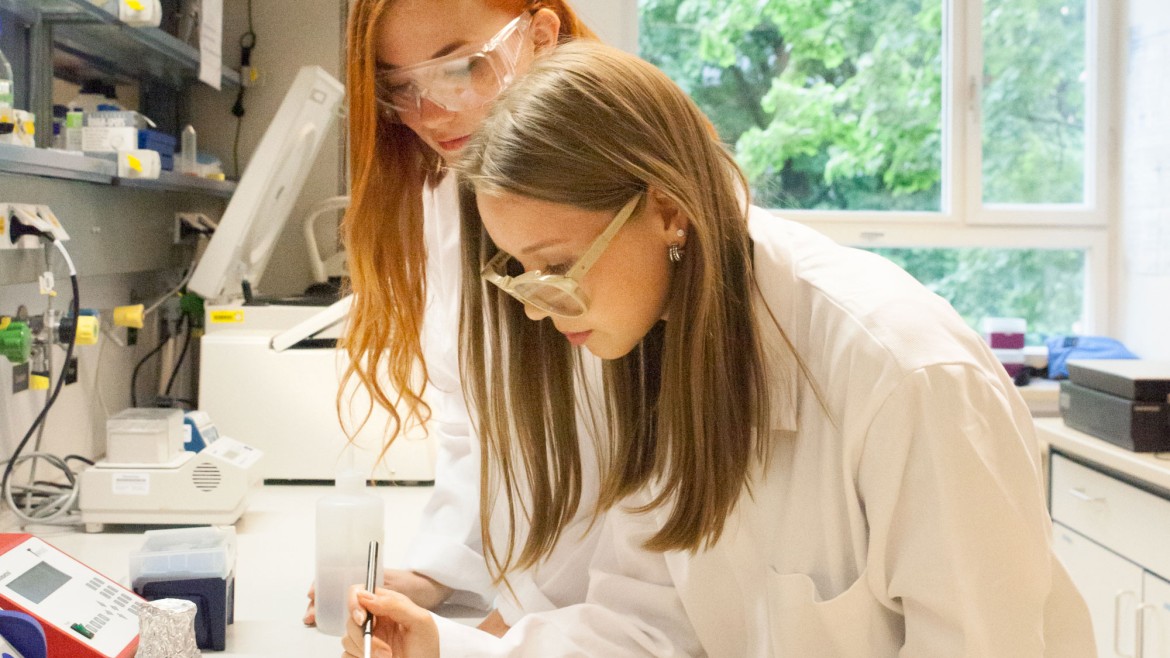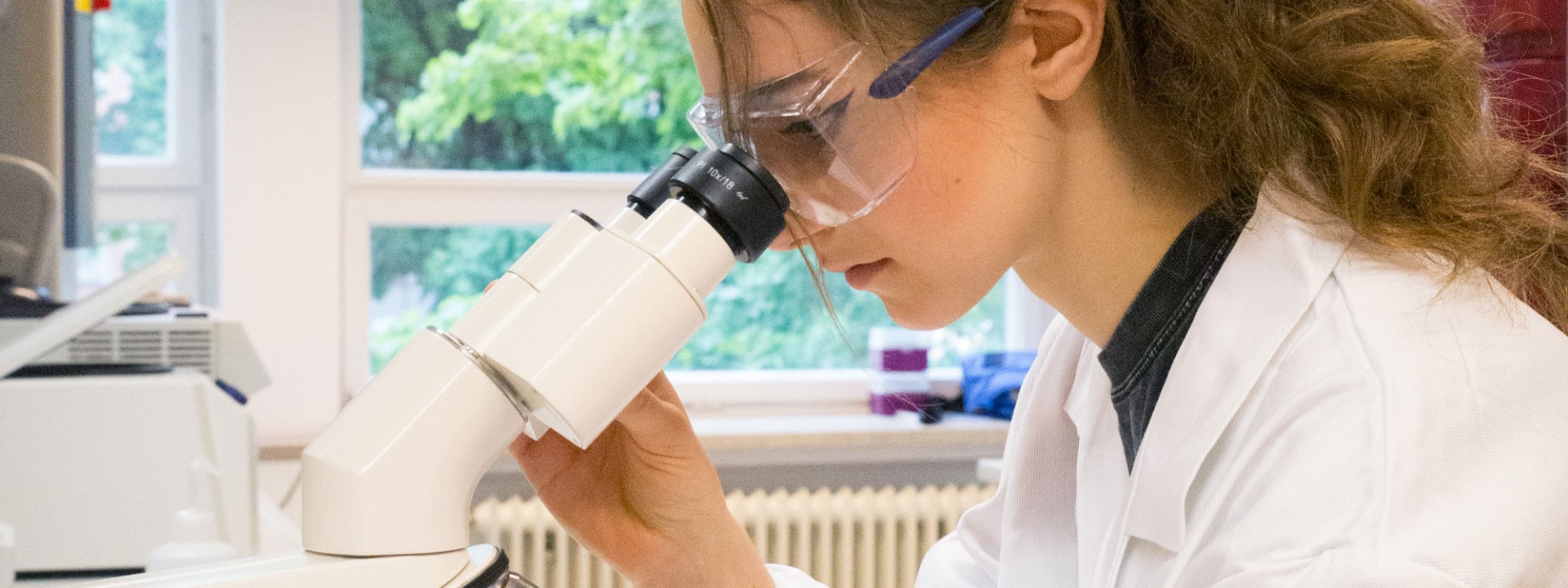Bioengineering (B. Eng.)
Bioengineering is an interdisciplinary field with an emphasis on application. It is located at the interface between science and technology with a clear biological orientation.

The professional practice of bioengineers is closely linked to the technical application of scientific knowledge.
In their profession, they use the tools of traditional engineering disciplines such as mechanics, materials technology, design and measurement and control technology to solve tasks that arise, for example, in the biotechnical, medical-pharmaceutical or environmental technology sectors.
The combination of basic scientific knowledge with engineering know-how in conjunction with knowledge of electronic data processing is therefore of outstanding importance.
Requirements for the study of Bioengineering at the Munich University of Applied Sciences are:
Advanced technical college certificate or the general or specific higher education entrance qualification (preferably with a concentration in the natural sciences or technical fields of study).
These further personality characteristics are important:
- Interest in questions relevant to the natural sciences and technology
- Willingness to work in interdisciplinary fields
- Comprehension of complex relationships
- Curiosity about the unknown, the new, the untried
- Flexibility
The interdisciplinary course of study of bioengineering aims to provide practice-oriented instruction, based on the principles of science. The goal is to create knowledge and teach those methods which enable a biochemical engineer or bioengineer to work as an autonomous professional. Through extensive training in core subjects, both in the natural sciences and in the fields of engineering science, students learn to recognize important relationships within processes. Graduates have developed the flexibility to match the rapid pace of technological development with a thorough grounding and the skills to keep up with new developments, especially in the exploding area of biotechnology.
Training in the relevant disciplines also enables graduates to detect the effects of biological and chemical systems on humans, the environment and to evaluate their observations properly.
The professional academic program is complemented by the acquisition of knowledge in the field of economics. Interpersonal communication skills, not a natural gift for many students of the natural sciences, are developed. Such soft skills are becoming ever more important as the need for multidisciplinary solutions to complex problems increases.
The first two semesters of the course of study are concerned with the basics. An in-depth education in the technical fields follow. In addition, students can determine a large part of the content of their study through individual choices from subject/specific elective modules from within the main concentrations of "medical and pharmaceutical technology" and "environment". This course of study provides a thorough and broad basis in the field while allowing room for each student's inclinations, interests and career goals.
Upon successful completion of the course of study, the academic degree "Bachelor of Engineering" (B. Eng.) is awarded.
In addition to the professional qualification, successful completion of the bachelor's degree is also the basis for further academic skills development in a subsequent master's program. The departement offers such master's programs as a Master of Biotechnology / Bioengineering. This course of study is offered in close cooperation with the University of Applied Sciences at Weihenstephan / Triesdorf .Another option is to deepen the graduate’s academic qualifications through a consecutive master’s degree in Micro-and Nanotechnology.
The goals listed above are part of a qualification profile which has proved itself in the following areas – both in areas of core competency and closely related fields as well as those associated with bioengineering
Core Competencies, which consist of the following areas of expertise or knowledge.
- Understanding, assessment and communication of complex technical and scientific concepts in solving technical problems.
- Understanding of functional principles of biotechnology and biomedical equipment and their technical aspects.
- Design and construction of devices and equipment for the fields of biotechnology, biomedical engineering, and involvement in their production and operation.
- Cultivation of cells and use of cells or cell components for the solution of applied problems, for example in biotechnology and food analysis as well as genetic engineering.
- Application of modern analytical techniques and analytical instruments in various biotechnological fields such as molecular biology, biomedical analysis, food analysis, environmental research.
- Development, optimization and validation of new measurement and analysis techniques.
- Use of measurement and control technology for process control of structures in the test and on the scale of production.
- Use of automation technology in biotechnology and biomedicine.
- Use of biocompatible materials.
- Applying quality management to biotechnical processes.
Associated Areas of Competence:
- Basic knowledge in the design, planning and realization of production
- Firm command of the development, optimization and validation of new production.
- The ability to be responsible for and to monitor production processes involving chemical or biological metabolisms (such as upstream and downstream processes, including quality assurance).
Depending on the selected combination of modules in advanced studies, additional skills can be developed in the following areas:
- Development of pharmaceuticals, medical laboratory diagnostics and biosensorics.
- Medical engineering – Prosthetics, bio-mechanics, imaging.
- Environment – Environmental analysis, environmental protection, environmental law, regenerative energy.
In addition to these core and associated competencies, students learn the fundamentals of business. Through seminars and internships, students learn to work in teams to document their work content and work in the life sciences precisely and correctly.
The course of study consists of six semesters of theory and one internship semester.
The bachelor’s thesis is expected to require four months, and is usually written under the auspices of a firm which cooperates with the university. This cooperation is often a first contact to the industry which leads to employment.
German Language Requirement Note:
Most lecturers are held in the German language. Competency in spoken and written German sufficient as to succesfully complete the Bachelor or Master Courses of Study is required.

The thorough and broad education in Bioengineering allows graduates to pursue many different fields of application such as research, methods and process development and optimization, analytics, automation, equipment development, equipment and plant construction, production or in service fields (consulting, service, training and training, etc.).
Professional opportunities in business enterprises (chemical and pharmaceutical industry, food industry, cosmetics industry, etc.) and professional associations, universities and institutes as well as in highly specialized agencies and other institutions of the civil services (environment, health, consumer protection, etc.) are open to our graduates. The emphasis on soft skills and introduction to economics and business help prepare our graduates to achieve self-employed or freelance goals if they wish. Graduates of the course work in different areas of biology, engineering and life sciences companies. Continuous improvement of the program is made possible through extensive follow up with interns, graduates of the current and earlier diploma courses of study as well as feedback from businesses and other institutions.
The jobs wanted ads show current interest for graduates of the program in:
- Drug Discovery
- Apparatus development (laboratory automation, analytical instrumentation, sensors and biosensors)
- Medical techniques (e.g., prosthetics, medical equipment).
- Clinical diagnostics.
- Environment (for instance, analytics, environmental protection)
- Energy technologies (such as regenerative energies)
- Technical service fields (consultation, service, repair)
- Quality management in the laboratory and production sectors.
- Biotechnological production (e.g., pharmaceuticals, the food industry)
- Research and development at universities and research institutes (such institutes as, for instance, the Fraunhofer Gesellschaft or the Helmholtz Zentrum, conduct research in the fields of life sciences and environmental studies)
- Consulting
The thorough and broad academic preparation of graduates of the course of study of bioengineering provides alumni with the qualifications to also find opportunities in various branches which are only indirectly connected to bioengineering. Through this course of study, career flexibility is built upon a solid academic foundation.
The employment market for Bioengineers is, as in all professions, subject to the vagaries of the general economic conditions. Because these careers are usually within the areas of biotechnology which belong to the key technologies of the 21 century, the career opportunities for new bioengineers are generally outstanding. The growing market of the life sciences is especially attractive for young, motivated bioengineers with a thorough and broad academic background
Previous graduates of the course of study of bioengineering are highly regarded both by industry as well as in research centers. This has led to a strong demand for interns who prepare their thesis in cooperation with firms and research centers. Detailed surveys from both firms, universities and other institutes have demonstrated the overall positive reception to this course of study.

